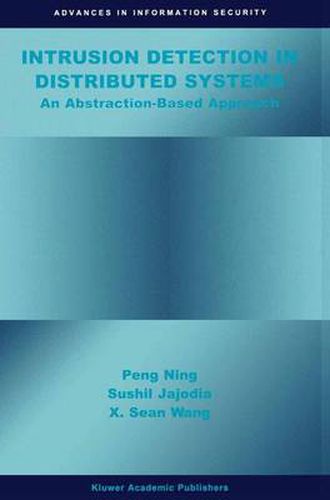Readings Newsletter
Become a Readings Member to make your shopping experience even easier.
Sign in or sign up for free!
You’re not far away from qualifying for FREE standard shipping within Australia
You’ve qualified for FREE standard shipping within Australia
The cart is loading…






This title is printed to order. This book may have been self-published. If so, we cannot guarantee the quality of the content. In the main most books will have gone through the editing process however some may not. We therefore suggest that you be aware of this before ordering this book. If in doubt check either the author or publisher’s details as we are unable to accept any returns unless they are faulty. Please contact us if you have any questions.
Intrusion detection systems (IDS) are usually deployed along with other preventive security mechanisms, such as access control and authentication, as a second line of defense that protects information systems. Intrusion detection complements the protective mechanisms to improve the system security. Moreover, even if the preventive security mechanisms can protect information systems successfully, it is still desirable to know what intrusions have happened or are happening, so that the users can understand the security threats and risks and thus be better prepared for future attacks. Intrusion detection techniques are traditionally categorized into two classes: anomaly detection and misuse detection. Anomaly detection is based on the normal behavior of a subject (a user or a system); any action that significantly deviates from the normal behaviour is considered intrusive. Misuse detection catches intrusions in terms of characteristics of known attacks or system vulnerabilities; any action that conforms to the pattern of known attack or vulnerability is considered intrusive. Alternatively, IDS may be classified into host-based IDSs, distributed IDSs, and network based IDSs according to the source of the audit information used by each IDS. Host-based IDSs get audit data from host audit trails and usually aim at detecting attacks against a single host; distributed IDSs gather audit data from multiple hosts and possibly the network and connects the hosts, aiming at detecting attacks involving multiple hosts; network-based IDSs use network traffic as the audit data source, relieving the burden on the hosts that usually provide normal computing services. Intrusion Detection In Distributed Systems: An Abstraction-Based Approach presents research contributions in three areas with respect to intrusion detection in distributed systems. The first contribution is an abstraction-based approach to addressing heterogeneity and autonomy of distributed environments. The second contribution is a formal framework for modelling requests among co-operative IDSs and its application to Common Intrusion Detection Framework (CIDF). The third contribution is a novel approach to coordinating different IDSs for distributed event correlation.
$9.00 standard shipping within Australia
FREE standard shipping within Australia for orders over $100.00
Express & International shipping calculated at checkout
Stock availability can be subject to change without notice. We recommend calling the shop or contacting our online team to check availability of low stock items. Please see our Shopping Online page for more details.
This title is printed to order. This book may have been self-published. If so, we cannot guarantee the quality of the content. In the main most books will have gone through the editing process however some may not. We therefore suggest that you be aware of this before ordering this book. If in doubt check either the author or publisher’s details as we are unable to accept any returns unless they are faulty. Please contact us if you have any questions.
Intrusion detection systems (IDS) are usually deployed along with other preventive security mechanisms, such as access control and authentication, as a second line of defense that protects information systems. Intrusion detection complements the protective mechanisms to improve the system security. Moreover, even if the preventive security mechanisms can protect information systems successfully, it is still desirable to know what intrusions have happened or are happening, so that the users can understand the security threats and risks and thus be better prepared for future attacks. Intrusion detection techniques are traditionally categorized into two classes: anomaly detection and misuse detection. Anomaly detection is based on the normal behavior of a subject (a user or a system); any action that significantly deviates from the normal behaviour is considered intrusive. Misuse detection catches intrusions in terms of characteristics of known attacks or system vulnerabilities; any action that conforms to the pattern of known attack or vulnerability is considered intrusive. Alternatively, IDS may be classified into host-based IDSs, distributed IDSs, and network based IDSs according to the source of the audit information used by each IDS. Host-based IDSs get audit data from host audit trails and usually aim at detecting attacks against a single host; distributed IDSs gather audit data from multiple hosts and possibly the network and connects the hosts, aiming at detecting attacks involving multiple hosts; network-based IDSs use network traffic as the audit data source, relieving the burden on the hosts that usually provide normal computing services. Intrusion Detection In Distributed Systems: An Abstraction-Based Approach presents research contributions in three areas with respect to intrusion detection in distributed systems. The first contribution is an abstraction-based approach to addressing heterogeneity and autonomy of distributed environments. The second contribution is a formal framework for modelling requests among co-operative IDSs and its application to Common Intrusion Detection Framework (CIDF). The third contribution is a novel approach to coordinating different IDSs for distributed event correlation.